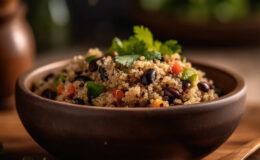Let’s all take a moment and think about the relationship we have with food. Think about how you view food, how you categorize it, and how you feel when you eat.
A Healthy Relationship with Food
Having a healthy relationship with food is important for everyone. There are certainly foods that aren’t as good for us and ones that are much better. However, classifying things as “good” or “bad” is inherently bad. It can lead to us feeling guilty about eating certain foods, which is dreadful. Food is something that should be enjoyed not feared or dreaded. Enjoying the occasional less nutritious food is important to our well-being. I guess like the saying goes we should “have our cake and it eat it too” (because who just looks at cake?)
Separate the Good from the Bad
Foods that have less nutritional value are okay to eat in moderation (moderation meaning once or twice a week or even just once or twice a month for some, not once a day). This includes foods that are highly processed, have added sugar, have artificial sweeteners, and foods high in saturated fat. So how can you spot these foods? One of the easiest ways is to look at the nutrition label.
Foods that are highly processed are going to have a much longer ingredient list and most likely it will be hard to pronounce half of those ingredients, or you may not know what they even are. When choosing pre-packaged foods it is best to choose options that have fewer ingredients in them, and it is important to be able to pronounce the majority of them.
Added sugar can sometimes be tricky to spot. The grams of sugar on the nutrition facts won’t always be able to tell you this; it is something you will have to check the ingredients list for. If you see sugar, high fructose corn syrup, corn syrup, fructose, or any other kind of syrup on the list that means the product has added sugar. Following a healthy diet and eating the recommended 3-4 servings of fruit per day will give you quite a bit of natural sugar alone. Some veggies even have natural sugar. Eating more fruit, whole grains and veggies is a good way to start eating less added sugar, just be sure to check that the whole grains being consumed (especially bread, cereal, and pre-packaged oatmeal) don’t have a lot of added sugar, or sugar as one of the first 3 ingredients (those three are the main ingredients usually).
Avoid Fake Foods Like Fake Friends
Along the lines of added sugar, artificial sweeteners are another one to avoid (unless of course you are diabetic). Artificial sweeteners are made in a lab, they are not natural, so you’re body doesn’t recognize them. They are also much sweeter than sugar (some being 1000 times sweeter). Artificial sweeteners have also been proven to increase sugar cravings, which is definitely not good. Artificial sweeteners are also known as sugar alcohols, which cause GI (gastrointestinal) distress and bloating. Some common examples of artificial sweeteners are sorbitol, mannitol, xylitol, erythritol, isomalt, malitol, acesulfame k, aspartame, neotame, saccharin, stevia, and sucralose.
The Skinny on Fats
Saturated fat is pretty easy to spot in a food just from reading the nutrition facts. You shouldn’t avoid saturated fat entirely but you should aim for 13 grams or less per day. Saturated fat can be found in fatty meats (fatty beef, lamb, pork, poultry with skin on), butter, cheese, dairy products made from whole or 2% milk, and fried foods. Choosing foods with higher amounts of mono- and poly-unsaturated fats is a much better option. These types of fats are key for healthy metabolism, decreasing risk of heart disease, and decreasing risk for Alzheimer’s. One catch to this is coconut oil (as long as it’s virgin, cold-pressed, and unrefined – only $6 at Trader Joe’s). There haven’t been enough studies done yet to have a definitive answer and whether it’s good or bad, but many nutrition and health professionals are advocating its benefits. The saturated fat in coconut oil is made up of medium chain fatty acids, which are much easier for the body to break down and can be utilized for energy faster than their longer chain counter parts.
Fuel Your Body
Again, less nutritious foods should not be avoided entirely, but should be enjoyed in moderation. It is important to eat a diet that is centered on fruits, veggies, whole grains, dairy (or dairy substitutes), lean protein, nuts, and legumes. Foods that are more nutritious will better fuel your body to do all of the things you ask of it throughout the day. Don’t ever feel guilty for eating something, enjoy it in the moment, and as long as you eat a balanced diet you have nothing to worry about!
– Holly
Holly Hirsch has a degree in Human Nutrition and Dietetics, from Clemson University.
Find this article interesting and useful? Share it! 🙂
Our mission at PushPointe is to motivate, educate, and inspire you to live the fit life. If you don’t already subscribe to the world’s most popular health and fitness site, you’re invited to join thousands in our health conscious community. Have a comment, question, or idea? Email us at info@pushpointe.com.
Live the Fit Life. Subscribe to Our Bi-Weekly Email











